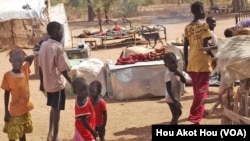Akuindiik Kueth is one of hundreds of people who fled to Northern Bahr el Ghazal state in South Sudan when the Sudanese Armed Forces invaded the oil-rich border area of Abyei in 2011.
But now, she, like many others displaced from Abyei, wants to return home in time for a referendum, set for October, on the disputed area's final status.
The conditions in the displaced camps in South Sudan are appalling, she said, adding that all the people need is a way to get back to Abyei, and they'll head home.
"We can move back if we get a means of transport to Abyei," she said.
"Now in this village we are suffering. During the rainy season last year, it rained constantly and we were in grass thatched shanty tukuls... which are not covered with plastic sheeting."
Many of the Abyei displaced have found it hard to find work in Northern Bahr al Ghazal, making it difficult for them to provide for their families.
When they have tried to grow their own food, they've met with failure -- something that stands in sharp contrast to the way life was in Abyei.
“We have grown food here the last two years, but the crops didn’t yield well. In Abyei you can plant crops on a small piece of land and it can be very productive," said Garang Mawein.
Once the displaced get back to Abyei, they want aid agencies to provide basic services, including schools, to provide their children with an education.
They also want to be assured that there will be adequate security in Abyei.
Aid agencies say at least 45,000 displaced have returned to Abyei in the last six weeks. More than 110,000 people fled the oil-rich area when Sudanese troops invaded in 2011, just two months before South Sudan declared its independence.
Abyei is the traditional homeland of the Ngok Dinka people, who have strong ties to South Sudan. Northern nomadic Arab herders regularly pass through the disputed area with their cattle.
The African Union put forward a proposal for Abyei last year aimed at protecting the rights of both the Ngok Dinka and the nomadic Misseriya people, while taking steps to resolve the conflict over the disputed area, but Khartoum rejected the AU plan.





